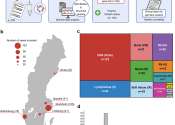Study unveils neural processes underpinning the re-emergence of consciousness after anesthesia
Before undergoing surgeries and other invasive medical procedures, patients typically undergo anesthesia. Anesthesia consists in giving patients a class of drugs (i.e., anesthetics) that cause them to lose feeling in specific ...









